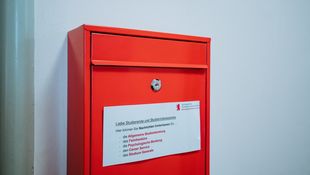International Students
Whether you are interested in a Bachelor’s, Master’s or a cooperative studies degree programme, we welcome all applicants! The following page provides information about degree programmes, admission requirements and everything you need to start a career.
Selecting and applying for a degree
Still looking? Find out what the HWR Berlin has to offer:
1.531
students come from more than 110 countries. There are around 11,500 students in total at the HWR Berlin.
26
of our 57 degree programme have an international orientation. International programmes at a glance
700
We work with 700 partner companies to provide cooperative studies degree programmes.
Find your degree programme
Find the right degree for you: Accounting and Controlling, International Business Management or perhaps The Political Economy of European Integration?
International degree programmes
Two steps to the right degree programme
Studying in English or French
Cooperative studies degree programmes
Obtain two degrees at once: Double Degree Programme
Degree programmes from A to Z
Services for refugees
Your application − how to get a place at the HWR Berlin
Preparing to start your degree
Do I need a visa or a residence permit? What do I need to know about health insurance? Find answers to a number of practical questions:
Do you come from a country in the EU, the EEA or from Switzerland?
Applicants from the European Union (EU), the European Economic Area (EEA) or Switzerland do not require a visa to enter Germany. Applicants require only a valid ID card and confirmation that they are registered as resident in Germany.
Not from the EU or EEA?
International students from certain countries do not require a visa to enter Germany. Visit the website of the German Federal Foreign Office to find out whether you need a visa.
You are required to register your address with the Berlin registry office as soon as you have found accommodation. Students who are planning to stay in Germany for longer than three months must apply for a residence permit.
- Registering your address
- Studying in Germany: residence permit
- Berlin Immigration Office: residence permits
Do you need a visa?
Nationals from many countries require a visa to enter Germany. If you are affected by this requirement, you should act early to apply for a visa.
Please note: This process can take a number of months. Please consult the German embassy in your home country for further information. The German Federal Foreign Office provides a list of German diplomatic missions throughout the world.
Are you planning to study in Berlin for longer than 90 days? If so, you need to apply to the Berlin Immigration Office for a residence permit within three months of your arrival.
How can I apply for a visa?
You can apply for an entry visa at the German diplomatic mission in your home country.
You will normally be required to present the following documents:
- Proof of admission to a German university
- Proof of health insurance
- Proof of any credits earned in previous degree programmes
- Proof of German language skills or any plans to participate in a German course
- Proof of how you intend to support yourself financially during your studies
Please note: This process can take a number of months. Please consult the German embassy in your home country for further information. The German Federal Foreign Office provides a list of German diplomatic missions throughout the world.
A student visa
The visa which you require depends on whether you already been admitted to a degree programme in Germany. As soon as you have your official admission, you should apply to the immigration authorities for a visa for study purposes.
Please note: Do not under any circumstances enter Germany as a tourist. A tourist visa cannot subsequently be converted into a visa for study purposes.
A visa for study purposes is usually issued for three months; you must apply for a residence permit within these three months.
How can I apply for a residence permit?
After checking your documents, the Berlin Immigration Office will convert your visa into a residence permit for study purposes. This residence permit is valid for two years.
Applicants for a residence permit for study purposes must usually provide the following documentation:
- A completed application form
- Your passport and a biometric photograph
- Confirmation of registration
- Proof that you hold health insurance
- Proof of financial support
- Confirmation of enrolment from your university
Please address any questions to the Berlin Immigration Office.
My residence permit will expire soon. What should I do?
We recommend that you apply to the Berlin Immigration Office to extend your residence permit three or four weeks before your current residence permit expires.
Did you enter Germany as a refugee?
A number of other rules apply to refugees. Please find out more from the Berlin Immigration Office:
Why do I need proof of financial support?
Before you can commence your studies at the HWR Berlin, you must prove that you are able to support yourself financially for an academic year. This means submitting “proof of funds”, which is usually required when you apply for a visa in your home country. You will definitely need proof that you have financial support when you apply for a residence permit in Germany at the latest.
How much money do I need?
As of September 2024, international student applicants are required to demonstrate that they have 11,904 euros per year.
How can I prove this?
There are a number of methods of demonstrating that you are financially secure.
- You can ask your parents for proof of their income and financial status.
- A person resident in Germany can guarantee to cover the costs of your studies.
- You can pay the sum of 11,904 euros into a blocked account.
- You can submit a bank guarantee.
- You submit proof that you are in receipt of a scholarship from a recognized provider.
We recommend that you inquire at the German embassy in your home country to find out what form this proof should take.
Further information is available here:
Why am I required to register my address?
Every resident in Germany is required by law to register their address in an official register.
Where should I register?
You can register at any one of roughly 40 citizens’ centres in Berlin (Bürgeramt) within 14 days after arrival in Berlin. You will need to register your new address every time you change accommodation. You will be issued with confirmation of registration, upon having registered your address. You will require this confirmation in order to do a number of things such as opening a bank account or signing a mobile telephone contract.
What do I need in order to be able to register?
You will need to submit a completed registration form, your passport or ID card, confirmation of residence from your landlord and other documents as required.
Find out more here:
Plan enough time for your studies
Many students of the HWR Berlin work part-time to fund their studies; typical student jobs include working as a shop assistant, restaurant staff or student employee. It is not always easy to find a job in Berlin, especially if your German is not so good. You should expect to do 40 hours of work per week for your degree programme.
Do you come from a non-EU state?
If you come from a country outside the European Union (EU) or the European Economic Area (EEA), you are subject to certain restrictions on the number of hours that you can work whilst registered as a student. You are permitted to work:
- up to 120 days per year, 8 hours per day or
- up to 240 days per year, 4 hours per day
without a work permit. You can work more than 20 hours a week in the non-teaching period. This does not affect the 120-day rule, which continues to apply. You will need permission from the Employment Office (Agentur für Arbeit) and immigration authorities to work more hours.
Do you come from an EU Member State?
Students from outside the EU, Liechtenstein, Norway, Island and Switzerland are permitted to find part-time employment or to work in a self-employed capacity in Germany. They are restricted to 80 hours a month.
When am I permitted to work?
- Internships: Compulsory internships which make up part of your degree programme are permitted. Other internships may only be undertaken as part of the 120 working days on which you are permitted to work; alternatively you can apply to the immigration authorities for an exception.
- Part-time student jobs: Part-time student jobs are not subject to any form of time restriction, and are not counted as part of your contingent of 120 working days per year. This kind of employment includes working as a student employee of a university or other academic institutions or for the General Students’ Committee.
- Self-employment: If you are an international student from a non-EU state, you are not permitted to work on a self-employed basis.
- Preparatory courses: If you are required to prepare for your studies by participating in language or other courses, you are not permitted to engage in part-time paid employment during that time.
Find out more here:
Sources of funding and scholarships
Do you know how you are going to fund your studies? Under certain circumstances, international students are permitted to apply to a range of scholarship programmes. The most important source of scholarships for international students is the German Academic Exchange Service (DAAD):
These websites provide information about other scholarships and sources of funding:
- International students: financing your studies
Video: "Tips for International Students - How do I finance my studies in Germany?" - My Stipendium
Sources of funding from the HWR Berlin
The HWR Berlin makes funding available in connection with certain degree programmes and works together with partners from industry or associations to provide scholarships.
The Studierendenwerk Berlin is happy to provide advice
The Studierendenwerk Berlin provides comprehensive advice about the subject of financing your studies:
What is the semester fee?
Students are required to pay a semester fee of c. 300 euros per semester, which covers an administration fee and the costs of a semester ticket. You must pay your semester fee on time before the start of the semester. Information about the exact cost of the semester fee is provided upon admission to or re-enrolment in a degree programme. Universities in Berlin do not charge tuition fees for Bachelor’s degree programmes.
How much money do I need per month to live?
That depends on your lifestyle. Berlin is not all that expensive in comparison with other major German cities. Statistically German students spend an average sum of 870 Euros per month.
Monthly costs which you can expect:
- Rent: 300 to 600 Euros
- Food: 120 to 250 Euros
- Telephone: 10 to 40 Euros
- Statutory health insurance: 105 Euros
- Personal liability insurance: 5 Euros
- Study materials: 0 to 50 Euros
- Transport: The cost of your semester ticket covers a ticket for travelling on public transport.
- Sport: 10 to 30 Euros
- Clothes, going out, hobbies: 100 Euros
- Lunch in the university dining hall: 3 to 7 Euros
- A coffee: 1.50 to 4.00 Euros
Find out more here:
Why do I need health insurance?
- In Germany, it is a legal requirement that international students hold valid health insurance.
- This is a precondition for enrolment and you will not be able to start your studies if you do not hold health insurance.
- You will be required to submit the relevant confirmation from your health insurance provider upon enrolment.
- Holders of statutory health insurance can obtain the necessary confirmation from their health insurance provider. Please request a certification for enrolment at a university (Bescheinigung für die Einschreibung an einer Hochschule).
- Confirmation from a private health insurance provider is not sufficient; you will be required to submit certification that you are not required to hold statutory health insurance (Befreiung von der Versicherungspflicht). This certification can be obtained from all providers of statutory health insurance, e.g. AOK or Techniker Krankenkasse.
Is your health insurance accepted in Germany?
Please check whether your current health insurance is recognized in Germany. The statutory health insurance policies of the following countries are accepted in Germany:
- The Member States of the European Union
- Bosnia Herzegovina
- Iceland
- Liechtenstein
- Morocco
- Macedonia
- Montenegro
- Norway
- Switzerland
- Serbia
- Tunisia
- Turkey
Agreements concluded between Germany and the countries on this list mean that their statutory health insurance schemes are recognized and accepted in Germany Private domestic or international health insurance policies from other countries may also be valid in Germany. Please contact your insurance provider to clarify this point. If your current health insurance is not valid in Germany, you must take out health insurance from a German health insurance provider.
Do you come from an EU Member State?
Students from an EU Member State can usually retain their existing health insurance. Holders of a European Health Insurance Card (EHIC) are insured in Germany. Should you wish to work part-time in addition to your studies, you may be required to take out health insurance from a German provider.
Do you come from a non-EU state?
Students from a non-EU country are required to take out health insurance from a German health insurance provider.
Should I take out statutory health insurance or private health insurance?
In Germany, students can choose between statutory and private health insurance
- If you are aged under 30, we advise taking out statutory health insurance. Coverage costs a little over 100 Euros a month, a figure which includes nursing care insurance. If you need to consult a doctor or a dentist or to go to hospital, you only need to show your insurance card to obtain treatment. Your insurance policy will cover almost all the costs.
- If you are aged 30 years or older, you are required to take out private health insurance. Please consult the immigration authorities as to whether it will accept your private health insurance; not all providers comply with official requirements.
- Please note: If you purchase private health insurance, you are no longer permitted to change to a provider of statutory health insurance.
- Important: If you decide to take out private health insurance, you will be required to pay for all the costs of treatment in advance; your insurance provider will then reimburse you when you submit the bills. This can cause difficulties in the case of expensive treatment. We advise you to check with your health insurance provider about what costs are covered.
By when do I need to hold health insurance?
Students must hold health insurance by the start of the semester, i.e. usually from 1 March (summer semester) or 1 October (winter semester). Please note: if you do not hold health insurance, your university is required to disenrol you.
Find out more here:
Start house-hunting early
The HWR Berlin does not provide any student accommodation on its campus as is perhaps familiar from your home country. We recommend that you start looking for a place to live as early as possible, so that you do not experience any last-minute difficulties. Students usually live either in a hall of residence, a shared flat or a flat. The Studierendenwerk Berlin provides information about accommodation:
Halls of residence provided by Studierendenwerk Berlin
Student halls of residence are spread across the whole city, and travelling up to 60 minutes to and from university is normal in Berlin. Applications for a place in a student hall of residence must be made to Studierendenwerk Berlin. As the number of places is restricted, we recommend that you also look for private accommodation at the same time.
A room in a shared flat
A shared flat is a popular alternative to a hall of residence. These websites list rooms for rent in shared flats:
Private accommodation
Private accommodation in Berlin is usually more expensive than a place in a hall of residence. The majority of flats are unfurnished and you are usually required to bring your own furniture.
- Landlords also usually require a deposit of three months net rent (not including utilities).
- You will recover this deposit upon moving out, as long as you have maintained the flat in an acceptable condition.
You can find advertisements for flats and shared flats in a range of listings, including the Berlin daily newspapers and magazines, the university noticeboards and online:
Special offers for Students:
Guide on flat hunting in Berlin
Please use the extensive guide below that has been created about flat hunting in Berlin.
Studying and starting a career
Starting your studies nice and easy

Photo: © olaser/Getty Images/iStockphoto
The HWR Berlin provides advice and support to help you develop the skills which you need to complete your studies. Courses to help international students settle in to the HWR Berlin are provided within the scope of the General Studies programme:
Information and services to help get started:
Starting your studies
Enrolment and re-enrolment
Psychological counselling
Choosing the right job and launching your career

What comes after university? Photo: © Rawpixel/ iStock/ Getty Images Plus
Are you looking for the right job or internship? Working within the framework of the DAAD-funded project Integra, the HWR Berlin provides advice and support to international students with or without a refugee background relating to every aspect of starting a career.
Careers advice
Do you have questions about the application procedure, internships or the German employment market? If you do, the English-language Moodle course “Study and Stay” for international students is just the thing for you. Register, get information about exclusive events, career fairs and English-language job postings and make an appointment for an individual CV Check, in German or English.
Careers workshops to launch your career
Working within the scope of the General Studies programme, the Career Service provides workshops and seminars in both German and English focussing on how to prepare for your career.
The HWR Berlin also runs courses which prepare international students to enter the German employment market. In summer semester 2022, we ran the English-language workshop:
Networking with companies
The Career Services organize events with companies which are of special interest to international students.
Information and services to launch your career:
Moodle course: Study & Stay
Go Praktikum
What next? Services from the Career Services
Stellenticket: job openings for graduates
Writing a doctoral thesis at the HWR Berlin
Alumni: you are part of the family












